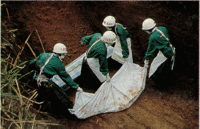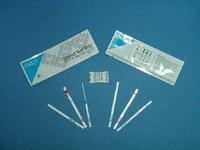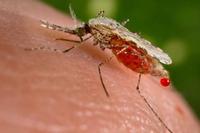-
Radiation dose passengers receive from airport scanners is low
An independent task force examining X-ray backscatter scanners at LAX airport determines that that people absorb less radiation from airport X-ray backscatter scanner than they do while standing in line waiting for the scan.
-
-
FDA shuts down more than 1,500 online pharmacies

The U.S. Food and Drug Administration (FDA) and Interpol have shutdown 1,677 online pharmacies for selling counterfeit or substandard medication and selling drugs without the necessary safeguards.
-
-
FDA warns about vulnerability of medical devices to hacking
The Food and Drug Administration (FDA) has warned manufactures of medical devices implanted into the human body, such as pacemakers and insulin pumps, to step up their cybersecurity efforts. The agency said it has discovered “cybersecurity vulnerabilities and incidents that could directly impact medical devices or hospital network operations.”
-
-
FDA-approved medications may stop deadly ebola

Ebola infections carry fatality rates of up to 90 percent. It strikes both humans and other primates, and there are fears it could be used as a biological weapon. There is no cure. New research suggests that a class of drugs that includes treatments for breast cancer and infertility appears able to inhibit the deadly, incurable Ebola virus.
-
-
New microfluidic chip useful in counterterrorism, water and food safety
A new process for making a three-dimensional microstructure that can be used in the analysis of cells could prove useful in counterterrorism measures and in water and food safety concerns. Researchers developed a new microfabrication technique to develop three-dimensional microfluidic devices in polymers. Microfluidics deals with the performance, control, and treatment of fluids that are constrained in some fashion.
-
-
Dangerous strains of E. coli may linger longer in water
A toxin dangerous to humans may help E. coli fend off aquatic predators, enabling strains of E. coli that produce the toxin to survive longer in lake water than benign counterparts, a new study finds. The research may help explain why water quality tests do not always accurately capture water-related health risks.
-
-
Responding to public health emergencies

Over the past decade, community engagement has become a central tenet of U.S. federal approach to public health emergency preparedness. Little is known, however, about how the vision of a ready, aware, and involved populace has translated into local practice.
-
-
Studying the deadly secrets of flu, Ebola, West Nile viruses
In an effort to sort out why some viruses such as influenza, Ebola, and West Nile are so lethal, a team of U.S. researchers plans a comprehensive effort to model how humans respond to these viral pathogens. The goal of the study will be to provide a detailed molecular understanding of what occurs when these viruses infect their hosts, providing a foundation for the design and development of a new generation of drugs to thwart infection by some of the world’s most serious pathogens.
-
-
Six out of ten people on Earth still lack access to flush toilets, adequate sanitation
It may be the twenty-first century, with all its technological marvels, but six out of every ten people on Earth still do not have access to flush toilets or other adequate sanitation — measures that protect the user and the surrounding community from harmful health effects — according to a new study.
-
-
Faster method to identify Salmonella strains
There are more than a million estimated cases of salmonellosis annually in the United States, resulting in approximately 400 deaths, nearly 20,000 hospitalizations and an economic burden of millions of dollars. New method may significantly reduce the time it takes health officials to identify Salmonella strains.
-
-
Health impact of Chernobyl accident overestimated: study

The impact of the Chernobyl nuclear accident has been seriously overestimated, while unfounded statements presented as scientific facts have been used to strangle the nuclear industry, according to Russian researchers.
-
-
Current methods of reducing arsenic contamination of water are not effective
Arsenic is now recognized to be one of the world’s greatest environmental hazards, threatening the lives of several hundred million people. Naturally occurring arsenic leaches into water from surrounding rocks and once in the water supply it is both toxic and carcinogenic to anyone drinking it. New research finds that most of the current technologies used around the world to reduce arsenic contamination are ineffective.
-
-
New malaria test kit would help global elimination efforts

A new, highly sensitive blood test that quickly detects even the lowest levels of malaria parasites in the body could make a dramatic difference in efforts to tackle the disease in the United Kingdom and across the world, according to new research.
-
-
Rendering mosquitoes immune to malaria parasites

Scientists have established an inheritable bacterial infection in malaria-transmitting Anopheles mosquitoes that renders them immune to malaria parasites. The strategy holds promise for malaria control efforts.
-
-
Silica particles purify water by acting as oil magnets
Engineers develop an innovative method designed to purify water through the rapid removal of oily pollutants. The technology involves the deployment of surface engineered silica particles, which act as oil magnets in water, adsorbing oil, yet repelling water.
-
More headlines
The long view
We Ran the C.D.C.: Kennedy Is Endangering Every American’s Health
Nine former leaders of the Centers for Disease Control and Prevention (CDC), who served as directors or acting directors under Republican and Democratic administrations, serving under presidents from Jimmy Carter to Donald Trrump, argue that HHS Secretary Roert F. Kennedy Jr. poses a clear and present danger to the health of Americans. He has placed anti-vaxxers and conspiracy theorists at top HHS positions, and he appears to be guided by a hostility to science and a belief in bizarre, unscientific approaches to public health.
